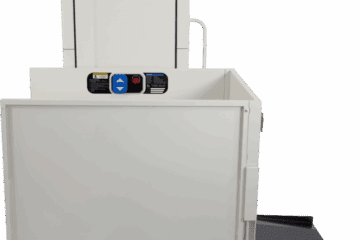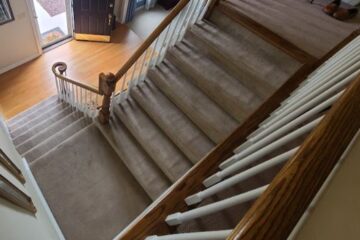Many people, including residents of the Lehigh Valley, confuse a lift chair with a chair lift (also known as a stair lift). A lift chair and a stair lift are two different types of mobility aids designed to assist individuals who have limited mobility, and they serve different purposes.
Lift Chair A lift chair, also known as a power lift recliner, is a specialized chair that helps people with mobility challenges to transition easily from a sitting to a standing position. It resembles a typical recliner or armchair but includes a lifting mechanism. The primary function of a lift chair is to lift the user gently into a standing position or lower them back into a seated or reclined position. These chairs are often used in living rooms, bedrooms, and other areas where individuals spend extended periods.
Stair Lift A stair lift, also referred to as a stairway lift or chair lift, is a motorized device that assists individuals with navigating the stairs when they have difficulty climbing or descending them. It consists of a motorized chair or platform that moves along a rail track, typically mounted to the stairs or the wall adjacent to the staircase. Stair lifts are specifically designed to transport individuals up and down the stairs, allowing them to remain seated and safely traverse the staircase without exerting physical effort.
In summary, the key distinction between a lift chair and a stair lift lies in their primary functions. A lift chair is a motorized chair that helps users transition between sitting and standing positions, while a stair lift is a device installed on stairs to transport individuals up and down the staircase, ensuring their safety and independence.
Who pays for a lift chair?
The payment for a lift chair can vary depending on various factors, such as the individual’s specific needs, location, healthcare coverage, and financial resources. Following are some common scenarios.
Out-Of-Pocket If the individual wishes to purchase a lift chair without any assistance, they can choose to pay for it out-of-pocket. In this case, the cost of the lift chair is the responsibility of the individual or their family.
Insurance Coverage In certain situations, health insurance plans or Medicare may provide coverage for a lift chair, but specific criteria must be met. For example, Medicare Part B may cover a lift chair if it is deemed medically necessary by a healthcare professional. However, Medicare typically only covers the lift mechanism and not the entire chair. Private health insurance plans may have different coverage policies, so it’s important to check with the insurer for details.
Veteran Benefits Veterans or their eligible dependents may be able to receive financial assistance for a lift chair through programs from the Department of Veterans Affairs (VA) and other veteran support organizations.
Assistance Programs Some local or national assistance programs, non-profit organizations, and charitable foundations may offer financial assistance or grants for mobility equipment, including lift chairs. These programs can vary depending on the location, so it’s worth researching local resources or contacting relevant organizations.
It’s important to note that coverage and reimbursement policies can change over time, so it’s advisable to consult with healthcare providers, insurance companies, and relevant organizations to get the most up-to-date and accurate information about payment options for lift chairs.
Who pays for a chair lift?
Payment for a chair lift can vary depending on factors such as the individual’s specific circumstances, location, healthcare coverage, and financial resources. The following are some common scenarios.
Out-Of-Pocket If the individual wishes to purchase a stair lift without any assistance, they can choose to pay for it out-of-pocket. In this case, the cost of the stair lift is the responsibility of the individual or their family.
Health Insurance Coverage Some health insurance plans may offer coverage for stair lifts, but it depends on the specific policy and the individual’s medical needs. Coverage for stair lifts can vary, and certain criteria must often be met for it to be deemed medically necessary. It is important to check with the insurance provider to understand their coverage policies and requirements.
Medicare Medicare typically does not cover stair lifts because they are considered home modifications rather than durable medical equipment. However, there may be exceptions in some cases. For example, if a stair lift is part of a larger home modification project prescribed by a healthcare professional as medically necessary, there may be a possibility of partial coverage. It’s essential to consult with Medicare and relevant healthcare professionals for specific details.
Veteran Benefits Veterans or their eligible dependents may be able to receive financial assistance for a stair lift through programs from the Department of Veterans Affairs (VA) and other veteran support organizations.
Medicaid Medicaid coverage for stair lifts varies by state, and it generally depends on the specific Medicaid program and the individual’s eligibility. Some Medicaid programs may offer coverage for home modifications, including stair lifts, if they are deemed medically necessary. It is important to check with the local Medicaid office or healthcare providers for information on coverage options.
Assistance Programs There might be local or national assistance programs, non-profit organizations, or charitable foundations that offer financial assistance or grants for home modifications, including stair lifts. Researching and contacting relevant organizations in the individual’s area can provide more information on potential assistance programs.
It’s important to note that coverage policies and reimbursement options can change over time, so it’s advisable to consult with healthcare providers, insurance companies, or relevant organizations in a timely manner to get the most up-to-date and accurate information about payment options for stair lifts.
If you live in Allentown, Bethlehem, Easton, Macungie, Schnecksville, Whitehall, Coopersburg, Quakertown, Kutztown, Northampton, Emmaus, Catasauqua, Nazareth, or other Lehigh Valley locations, call Power Stair Lifts for a free in-home estimate. We are independently owned and operated, not a franchise, and our mission is to serve our neighbors and community. Click through our site and web pages at powerstairlifts.com or call (484) 215-3232 to schedule your free home assessment and estimate.
For information about Power Stair Lifts’ other products, please click the following links:
Straight stair lifts: https://powerstairlifts.com/straight-stair-lift-home-lv-power-stair-lifts/
Curved stair lifts: https://powerstairlifts.com/curved-stair-lifts-residential-lehigh-valley/
Vertical platform lifts: https://powerstairlifts.com/vertical-platform-lift-lehigh-valley/
Vehicle lifts: https://powerstairlifts.com/vehicle-lifts-transport-mobility-devices-lehigh-valley/
Pool lifts: https://powerstairlifts.com/ada-pool-lifts-easy-water-access-lehigh-valley/
Aluminum ramps: https://powerstairlifts.com/platform-lifts-and-ramps-power-stair-lifts/
Installation of used stair lifts: https://powerstairlifts.com/used-stair-lifts-lehigh-valley/
Rental of stair lifts: https://powerstairlifts.com/rental-stair-lifts-lehigh-valley-home/
Stair lift maintenance, repair, and service: https://powerstairlifts.com/stair-lift-repair-lehigh-valley/
Stair lift financing in Pennsylvania: https://powerstairlifts.com/financing-stair-lifts-for-pennsylvanians/
Stair lift buyback program: https://powerstairlifts.com/used-stair-lift-buyback-program-lehigh-valley/
Stair lift parts replacement: https://powerstairlifts.com/parts-replacement/


